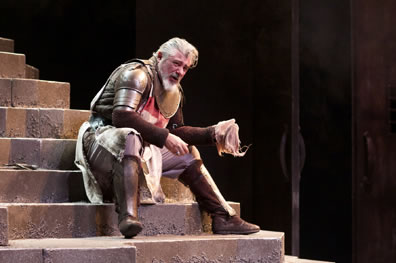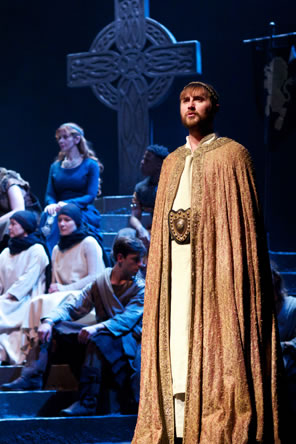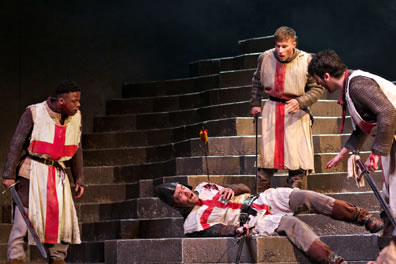Dunsinane
A Sequel to Shakespeare's Macbeth
Is Much More Than it Seems
By David Greig
National Theatre of Scotland, Royal Shakespeare Company, Shakespeare Theatre Company, Sidney Harman Hall, Washington, D.C.
Tuesday, February 3, 2015, 0–111&112 (center stalls)
Directed by Roxana Silbert

Siward (Darrell D'Silva), the English general, takes a break from the battles in the National Theatre of Scotland and Royal Shakespeare Company touring production of David Greig's Dunsinane, ostensibly a sequel to William Shakespeare's Macbeth. Photo by KPO Photo, courtesy of Shakespeare Theatre Company.
The word seems appears 138 times on this website. Make that 157 times. Seems is a great word. As a journalist it is my go-to CYA term: drop a seems into a sentence and fact becomes speculation, hard criticism becomes malleable opinion. What if is to Touchstone—“Much virtue in if,” the fool says in William Shakespeare's As You Like It—seem is to Malcolm of Shakespeare's Macbeth. “If a person in Scotland says, ‘It seems a person has died,' we tend to hear that word seems—seems—and, of course, that word makes a difference,” he says.
He says this not in Macbeth but in David Greig's brilliant sequel, Dunsinane, written in 2010, co-produced for the stage by the National Theatre of Scotland and the Royal Shakespeare Company, and now touring the United States. The Shakespeare Theatre Company in Washington, D.C., is currently hosting this superbly acted, tautly staged production, directed with sly humor and gut-twisting intensity by Roxana Silbert, which will continue on to the Chicago Shakespeare Theatre, Illinois, at the end of this month and the Wallis Annenberg Centre for the Performing Arts in Beverly Hills, California in March.
Actually, it only seems to be a sequel to Macbeth, in that the action picks up from where Shakespeare's play ends in 1054 Scotland, represented in Designer Robert Innes Hopkins' set as a 10-step platform crowned with a Celtic cross on one side of the otherwise bare stage and a rock trio—drum set, guitar, and cello—to the side (Nick Powell composed the atmospherically apt score combining metal rock with Celtic tonal meditations). Malcolm, Macduff, and the English general Siward try to bring peace and stability to the nation after the defeat of Macbeth, who always is referred to as “the tyrant.” However, Dunsinane has one key departure from Macbeth—or seems to, anyway—for the person who “seems” to have died in Malcolm's reference is the tyrant's wife, Lady Macbeth in Shakespeare's play but identified by her historical name, Gruach, in Dunsinane. Not only is she alive, she has a son, too, and this is problematic for establishing Malcolm's reign post-Macbeth.
As you get deeper into the play you begin realizing that this Scotland seems to be some place else. Parallel universes are in Hopkins costumes, especially the handmaidens wearing floor-length, simple Celtic dresses with covered heads. Parallel universes are in the landscape of steep barren hills and valleys where “nothing is solid” as described by the English Boy Soldier (Tom Gill), who also recounts marching from village to village for meetings with chieftains and encountering the villagers' “sharp glances” and “women's eyes burning at us.” The parallel universes are in the mysterious religious practices, food, and culture. The two universes are even parallel in the weather, except that in Scotland the extreme is cold rather than hot.
The most poignant parallel is in Siward (Royal Shakespeare Company veteran Darrell D'Silva), who is, in fact, Dunsinane's lead character and is the noble, courageous, tenacious army leader we know from Macbeth (all the characters continue in Dunsinane as Shakespeare portrayed them). Siward doesn't merely provide the army to defeat Macbeth, he sets out to establish a new and peaceful order in Scotland with a swift and general acceptance of Malcolm as king. He notes that a stable nation on its northern border is in England's national interest, but his ultimate intentions are to bring peace and prosperity to the Scottish people. That is his tragic flaw.
You see, while you can attach a seem to a sentence to turn fact into speculation, a person's perspective is built on a foundation of seems. Even when facts are presented, perspective turns that data into seems, and reality slips out of your grasp without you even being aware of it. The lesson Siward never learns in Dunsinane is the same lesson that dogged former British Prime Minister Tony Blair during the Iraq War (Greig has admitted in published interviews that he was writing a parallel portrait of Blair). It's a tragic flaw that also has undermined the good intentions of U.S. leaders (past and present) and its military over and over and over again. In fact, America seems to be on the verge of stepping into yet another Dunsinane of its own for the third—and maybe a fourth—time just in this century barely 15 years along.

Malcolm (Ewan Donald) addresses the council of chieftains and Queen Gruach (Siobhan Redmond, top in blue) in the National Theatre of Scotland and Royal Shakespeare Company production of Dunsinane. Photo by KPO Photo, courtesy of Shakespeare Theatre Company.
Greig lulls us into the metaphor rather than whopping us over the head with it. In fact, he leads off with the English Army disguising itself as Birnum Wood, a Monty Pythonesque skit of soldiers drilling as trees, bushes, and undergrowth. He then hooks us with the key plot twist right up front: the queen is very much alive. The next departure from the world established in Macbeth—or, rather, the world Shakespeare seemed to have established—is Siward's first lesson in the concept of seem described at the top of this review. I said previously that the Dunsinane characters that continue on from Macbeth are Shakespeare's, but Malcolm here is actually based on his self-description in Macbeth's England scene: “There's no bottom, none, in my voluptuousness,” he tells Macduff, and in Dunsinane we see he wasn't necessarily being disingenuous. Wearing a long gold robe hiding his hands as he seems to slide across the stage like a chess piece bishop, Ewan Donald's Malcolm maintains a calm demeanor and penchant for replying to verbal unpleasantries with “Mmm.” He seems an obvious stand-in for Nouri al-Maliki or Hamid Karzai, reminiscing fondly about his exile in England and bumping heads with Siward over what is Scotland's treasury, and what is the king's.
Having seen Malcolm's true nature established, we learn Scotland's true nature from Macduff (played by Keith Fleming with a matter-of-fact but stalwart sense of duty and drive). In a hilarious dialogue, he goes over the map of Scotland with Siward and describes the allegiances and deep traditions of the various clans. Siward blithely believes he can line up all the contending tribes because “We are the winning side.” I have to interject here that, as a journalist who covered the U.S. military for some 20 years, I actually heard a U.S. general use a phrase similar to that in describing why he foresaw eventual U.S. success in rebuilding Iraq. Macduff counters Siward's contention with a military man's logic: “To create that situation would require a very large army and it would take a very long time.” That echoes the advice General Eric K. Shinseki, then U.S. Army Chief of Staff, offered in the early phases of the Iraq War. Siward ignores Macduff's advice, too, asking for another option. “Kill the Queen. Put her head on a stick in the castle yard. End it,” Macduff replies.
Siward's own cultural perspective and sense of human rights would not allow that, of course, and he opts for a small (at first) peacekeeping force and nation-building diplomacy. Confounded by chieftains adhering to customs of courtesy and hospitality but refusing to come to political terms, and his army bedeviled by an insurgency that works in mysterious ways, including suicide attacks, with an almost mystical communication network, Siward responds by launching his own bloody reign of terror. All in the name of good, of course. “You're a good man, Siward,” Gruach tells him at play's end. “It would have been better if you weren't. There would have been much less blood.”
D'Silva anchors a splendid cast with his energetic playing of Siward. He might be accorded the sobriquet of fool in time, but D'Silva's Siward is no fool. Exemplifying the courageous dedication of a career soldier, he proceeds with the confidence of his own experience, education, and ethics. He maintains a respectful demeanor to everybody, from his lowest ranking soldiers to the chieftains who are clearly insulting him through their façade of courtesy. It is not ego that turns him into a cruel tyrant but bewilderment, and D'Silva plays Siward's declension well.
Siward also becomes infatuated with Gruach (Siobhan Redmond, who played the queen in the original production). It's easy to see why, as Redmond imbues her with gliding sensuality and commanding courage. Despite the destruction of her family and the occupation of her castle, she so stoutly grips her title of queen that she considers Siward's kindness toward her as condescending charity. She also sees weakness in his good intentions and entices him right into her bed. Their relationship lays bare Siward's faulty perceptions. She tells him flatly that she asked Macbeth to kill her first husband, yet Siward doesn't see her working her wiles on him. When Siward arranges for Gruach to marry Malcolm and thereby unite all of the clans, he is most worried about breaking her heart, not how long such a forced alliance could hold. Turns out it doesn't even last the wedding night as the insurgency erupts right before his eyes (not unlike the Sadr City uprising in Iraq).

Siward's second in command, Egham (Alex Mann), lies wounded as other English soldiers (from left Toyin Omari-Kinch, Tom Gill, and Arthur McBain) commiserate in comic scene of Dunsinane. Gill as the Boy Soldier plays a centerpiece role in David Grieg's play. Photo by KPO Photo, courtesy of the Shakespeare Theatre Company.
The play begins and ends, however, with the Boy Soldier, whom Gill plays with endearingly innocent charm. He provides a prologue describing how he was part of an army heading for Scotland “to install a king,” and throughout the play he steps forward to provide the story's big picture by recounting his own experiences within the army. He also is part of the action, involved in the battles and camp scenes and at the end serving as Siward's lone companion searching for Gruach with the body of her decapitated son.
It's instructive that Grieg relates the on-the-ground realities through the eyes of not only a common soldier but the youngest among them. It is the soldiers who are faced not with good intentions and diplomatic maneuverings and strategic initiatives but with living or dying on the battlefield. “Some of us new and eager for a fight and others not so sure but all of us both knowing and not knowing what lay ahead of us,” the Boy Soldier says in his opening speech. Grieg's purposes with this character are also metaphorical. The last scene involves Gruach, Siward, the Boy Soldier, and an infant. It provides one last lesson for Siward that his single-minded mission so consumes him he not only fails to see second, third, or fourth order of consequences, he can't see beyond the moment in front of him, even when that moment is governed by human nature—universal human nature. Finally, utterly defeated, Siward literally walks into oblivion, commanding the tired Boy Soldier to follow. “Where, sir?” he asks. Siward doesn't answer.
Eric Minton
February 9, 2015
Comment: e-mail editorial@shakespeareances.com
Start a discussion in the Bardroom



 Find additional Shakespeareances
Find additional Shakespeareances